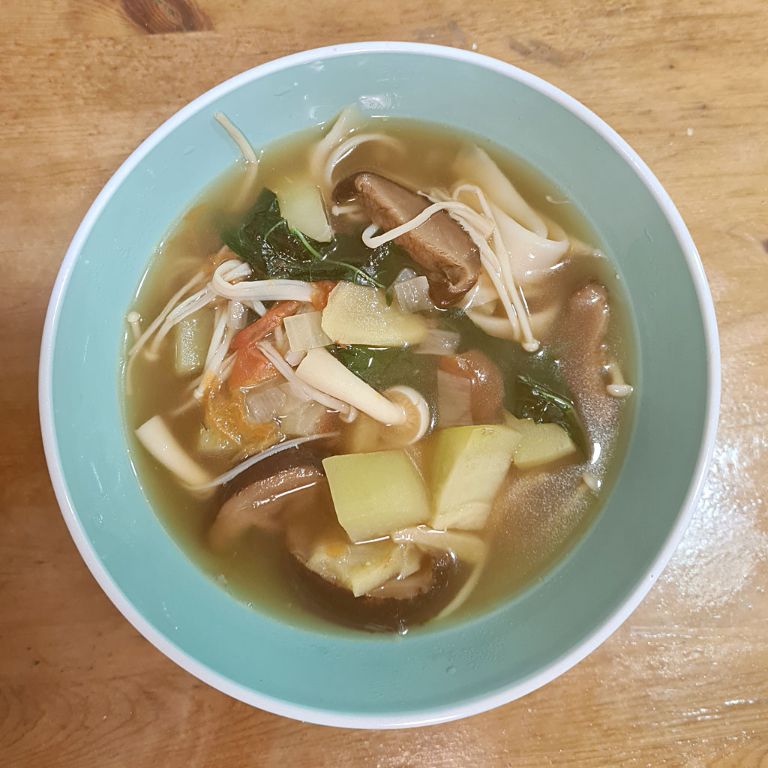Who else craves for a warm soup whenever it’s rainy or chilly? The warming gingery broth of Tinola usually comes to mind, but today’s featured dish is tinola’s sweeter sibling— Binakol.
This dish is from Western Visayas, but is now more common in Filipino restaurants everywhere. The flavor profile is very similar to tinola especiallly with the ginger and the vegetables included, but Binakol makes use of coconut water for the soup and is traditionally cooked in bamboo tubes or halved coconut shells.
The traditional chicken Binakol makes use of native chicken that is tougher and needs to be simmered for a long time. This completely plant-based version makes use of mushrooms. Mushrooms aren’t actually plants or are they animals. They’re classified as fungi, but are lumped in the vegetable category for cooking purposes.
Mushrooms are a good meat substitute replicating the texture of meat and having that great umami flavor that blends perfectly in savory dishes. One study showed that substitution of beef with mushrooms in a traditional ground beef recipe enhanced its overall flavor and reduced sodium intake by 25%. Despite having only 5mg of sodium in a cup of mushrooms, it is already very satisfying to the palate. It’s perfect for people who are trying to reduce their sodium intake.
Edible mushrooms are usually pale or white; and white colored foods are often thought to be nutrient-poor, but mushrooms are an exception! Mushrooms have been used as medicine throughout history by traditional and alternative health practices. They are now known to be both low-calorie and nutrient-rich. They’re rich in potassium, selenium, Vitamin B6, and Vitamin D (if grown under UV light).
Golden, oyster, shiitake and white button mushrooms have been shown to decrease the risk of developing memory and language difficulties that precede the development of Alzheimer’s disease. Regularly eating mushrooms have also been associated with decreased risk for anxiety and depression.
For those who have heart concerns, mushrooms are also beneficial for you. Oyster and shiitake mushrooms are high in beta glucans (dietary fiber) that decrease the absorption of dietary cholesterol and regulate blood sugar.
Mushrooms are also rich in antioxidants such as ergothioneine, which slows cellular damage. Think benefits such as anti-aging and anti-cancer! Eating about 1/8 cup of mushrooms a day may already reduce your risk of cancer by as much as 45%.
Combine all of these benefits with consuming your daily serving of vegetables in the Binakol soup, and you’re already on your way to having a hearty, healthy meal.
INGREDIENTS:
2 Tbsp oil
4 garlic cloves
2-inch or thumb-sized ginger
½ medium sized onion
3 Small ripe tomatoes
1/3 small young papaya
½ sayote
Enoki mushrooms
White shimmering mushrooms
3 dried shiitake mushrooms
2 cups rice water (hugas bigas)
2 cups coconut water
½ cup coconut meat
2 stalks lemon grass
1 ½ Tbsp vegan patis
1 bunch silk leaves
HOW TO MAKE:
- Soak dried shiitake mushrooms until spongy in texture. Rinse and discard 1st soaking water. Soak again in 1 cup of water. Keep 2nd soaking water for broth.
- Wash vegetables, mushrooms, herbs and spices.
- Chop vegetables, mushrooms, herbs and spices.
- Stir fry chopped garlic, ginger, and onion. Add shiitake mushrooms and continue stirring.
- Add 2nd soaking water of mushroom, rice water and 1 cup of coconut water. Bring to a boil.
- Add tomatoes, young papaya and sayote. Simmer for 5 minutes.
- Add enoki mushrooms, shimmering mushrooms, young coconut meat and lemon grass. Simmer for 5 more minutes.
- Turn of heat. Mix in silk leaves until wilted. Add the other cup of coconut water, stir, and serve.
SERVINGS: 4


.png)





.png)

